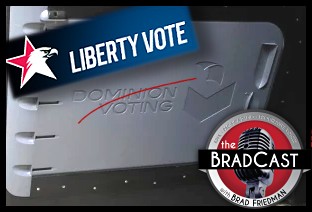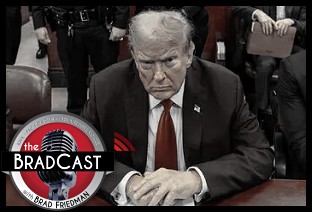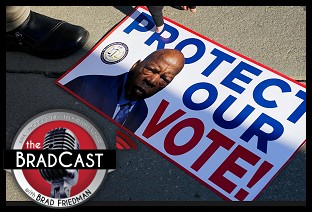 Brad Friedman was no doubt correct when he described the insanity that passed for a Second "Presidential Debate" as "one of the darkest chapters in modern U.S. Presidential history." That unfortunate event, however, led to a moment of extraordinary candor. Former Republican strategist Steve Schmidt told NBC's Chuck Todd that Donald Trump's candidacy had "exposed the intellectual rot in the Republican Party."
Brad Friedman was no doubt correct when he described the insanity that passed for a Second "Presidential Debate" as "one of the darkest chapters in modern U.S. Presidential history." That unfortunate event, however, led to a moment of extraordinary candor. Former Republican strategist Steve Schmidt told NBC's Chuck Todd that Donald Trump's candidacy had "exposed the intellectual rot in the Republican Party."
Schmidt's point is well taken, but there are also systemic sources for our current political malaise. These center upon (1) a privately-owned media system that elevates its own commercial interests over the public interest,, and (2) the euphemistically self-described "non-partisan" Commission on Presidential Debates (CPD) --- the undemocratic guardians of the status quo who, in conjunction with the two major political parties (which its commissioners represent) and the mainstream media, tirelessly strive to prevent Presidential debates from achieving their true function --- the facilitation of an informed electoral decision...
In a truly democratic society, both debates and a free press must work to ensure a fully informed electorate. "Knowledge will forever govern ignorance," James Madison observed; "and a people who mean to be their own governors must arm themselves with the power which knowledge gives."
The very structure of our money-driven, corporate media-controlled electoral system, especially in this post Citizens United era, serves to deprive the citizenry of their right to robust democratic discourse. As I previously explained, quoting Noam Chomsky, the control commercial media exert over the electoral process has created a "democracy deficit" --- the significant gap between the policy positions of the electorate and their elected "representatives." "Elections," Chomsky wrote, "are skillfully managed to avoid issues and marginalize the underlying population...freeing the elected leadership to serve the substantial people."
Over this past cycle we experienced a moment of relative enlightenment followed by a descent into darkness and the fascist insanity that is the Trump phenomenon. Bernie Sanders's astute decision to run within the Democratic Party provided access, albeit constricted, to both commercial media and debates. As a result, our national discourse was broadened to include some of the major issues we now face, e.g. a stark wealth disparity and the grave threat posed by global climate change, to name but a few.
But, as anticipated, Sanders's elimination at the end of the primaries, produced a severely constricted form of discourse, including what amounts to a near total exclusion of third party candidates. Indeed the media seldom mention those candidates, or their policies, except to describe them as "spoilers."
The CPD has erected a barrier that prevents candidates who have not secured 15% in pre-debate opinion polls from taking part in the debate. The MSM assists in assuring that third party candidates don't meet that threshold by dutifully failing to cover either their campaigns or conventions.
A threshold that is based on uninformed public opinion polls defeats the core purpose of a Presidential debate, which is to provide the public with a sufficient knowledge base so it can make an informed electoral decision. The CPD's exclusion of Stein and Johnson from the debate also defied the will of the electorate, 76% of whom favored inclusion. By way of its 15% threshold, the CPD facilitated a one-on-one that permitted a Republican candidate whose sanity may be in question to convert a "debate" into a salacious reality show.
By way of just one example, the following excerpt pertaining to jobs and climate change from the substantive dialogue between C-SPAN's Steve Scully and Green Party Presidential nominee Dr. Jill Stein, helps to illustrate the extraordinary disservice our current privately-held media and duopoly-controlled debate format have performed.
Stein: They are really one in the same. We incorporate a third crisis along with that. Unemployment, poverty, and climate change. We call for an emergency jobs program that will address the economic crisis and it puts them together because they can only be fixed together. Otherwise, people are pitted against each other given a choice between the climate or jobs because that is about survival today We call for a jobs program to give everyone a good paying, living wage job as part of this emergency green energy transition to revive the economy, turn the tide on climate change, and that will also make the wars for oil obsolete. Last point about this is we get so much healthier by eliminating fossil fuels. There are 200,000 people who die every year in this country from fossil fuel alone. On that basis alone, we save so much money from eliminating fuels that that health savings alone is enough to pay for the cost of the green energy transition, and we call for zeroing out fossil fuels by 2030.
Scully: And you think that's realistic?
Stein: Not doing that is not compatible with survival from what the science tells us. And it says that in all kinds of ways, whether you look at Jim Hansen's recent study that says we will be seeing double-digits of sea level rise as soon as 2060. A recent report put out by Oil Change International last week said that we have to zero out fossil fuels in the next seven years if we will avoid catastrophic climate change. We have got to declare a national emergency like we did after Pearl Harbor was bombed. You know how long it took us to transform the economy? No one would have said that was realistic, but it was a matter of national emergency. We will completely transform the economy [by] the war for our survival against climate change. If we can transform our economy [during] the Second World War in six months, we can do it in the next fifteen years.
That excerpt contains far more substantive information on issues that are of vital importance to the American people than Hillary Clinton and Donald Trump produced over the course of both of their debates.
Ernest A. Canning is a retired attorney, author, Vietnam Veteran (4th Infantry, Central Highlands 1968) and a Senior Advisor to Veterans For Bernie. He has been a member of the California state bar since 1977. In addition to a juris doctor, he has received both undergraduate and graduate degrees in political science. Follow him on twitter: @cann4ing


 Trump DOJ Takes Stand
Trump DOJ Takes Stand 'Green News Report' 11/13/25
'Green News Report' 11/13/25
 Mamdani's 'Surprisingly Afford-able' Affordability Agenda for NYC: 'BradCast' 11/12/25
Mamdani's 'Surprisingly Afford-able' Affordability Agenda for NYC: 'BradCast' 11/12/25 After the Shutdown and
After the Shutdown and 'Green News Report' 11/11/25
'Green News Report' 11/11/25 Victories for Democracy in Election 2025; Also: 7 Dems, 1 Indie Vote to End Shutdown in Senate: 'BradCast' 11/10/25
Victories for Democracy in Election 2025; Also: 7 Dems, 1 Indie Vote to End Shutdown in Senate: 'BradCast' 11/10/25 Sunday 'Ass Kicking' Toons
Sunday 'Ass Kicking' Toons 'We Can See Light at the End of the Tunnel' After Election 2025: 'BradCast' 11/6/25
'We Can See Light at the End of the Tunnel' After Election 2025: 'BradCast' 11/6/25 'Green News Report' 11/6/25
'Green News Report' 11/6/25 TEAM BLUE TRIUMPH! Dems Win Everything Everywhere All at Once: 'BradCast' 11/5/25
TEAM BLUE TRIUMPH! Dems Win Everything Everywhere All at Once: 'BradCast' 11/5/25  Repub Thuggery As Americans Vote: 'BradCast' 11/4/25
Repub Thuggery As Americans Vote: 'BradCast' 11/4/25 'Green News Report' 11/4/25
'Green News Report' 11/4/25 Last Call(s) Before Election Day 2025: 'BradCast' 11/3/25
Last Call(s) Before Election Day 2025: 'BradCast' 11/3/25 Sunday 'Close Enough' Toons
Sunday 'Close Enough' Toons A Pretty Weak 'Strongman':
A Pretty Weak 'Strongman': 'Green News Report' 10/30/25
'Green News Report' 10/30/25 Proposal for 'Politically Viable Wealth Tax' Takes Shape in CA: 'BradCast' 10/29
Proposal for 'Politically Viable Wealth Tax' Takes Shape in CA: 'BradCast' 10/29 Monster Storm, Endless Wars, Gamed Elections: 'BradCast' 10/28/25
Monster Storm, Endless Wars, Gamed Elections: 'BradCast' 10/28/25 Let's Play 'Who Wants to Be a U.S. Citizen?'!: 'BradCast' 10/27/25
Let's Play 'Who Wants to Be a U.S. Citizen?'!: 'BradCast' 10/27/25 Exiled NOAA Scientists Resurrect Critical Disaster Database: 'BradCast' 10/23/25
Exiled NOAA Scientists Resurrect Critical Disaster Database: 'BradCast' 10/23/25 Trump-Allied GOP Partisan Buys Dominion Voting Systems: 'BradCast' 10/22/25
Trump-Allied GOP Partisan Buys Dominion Voting Systems: 'BradCast' 10/22/25 Trump, Republican Law(lessness) & (Dis)Order: 'BradCast' 10/21/25
Trump, Republican Law(lessness) & (Dis)Order: 'BradCast' 10/21/25 Celebrating 'No Kings': 'BradCast' 10/20/25
Celebrating 'No Kings': 'BradCast' 10/20/25 SCOTUS Repubs Appear Ready to Gut Rest of Voting Rights Act: 'BradCast' 10/16/25
SCOTUS Repubs Appear Ready to Gut Rest of Voting Rights Act: 'BradCast' 10/16/25
 VA GOP VOTER REG FRAUDSTER OFF HOOK
VA GOP VOTER REG FRAUDSTER OFF HOOK Criminal GOP Voter Registration Fraud Probe Expanding in VA
Criminal GOP Voter Registration Fraud Probe Expanding in VA DOJ PROBE SOUGHT AFTER VA ARREST
DOJ PROBE SOUGHT AFTER VA ARREST Arrest in VA: GOP Voter Reg Scandal Widens
Arrest in VA: GOP Voter Reg Scandal Widens ALL TOGETHER: ROVE, SPROUL, KOCHS, RNC
ALL TOGETHER: ROVE, SPROUL, KOCHS, RNC LATimes: RNC's 'Fired' Sproul Working for Repubs in 'as Many as 30 States'
LATimes: RNC's 'Fired' Sproul Working for Repubs in 'as Many as 30 States' 'Fired' Sproul Group 'Cloned', Still Working for Republicans in At Least 10 States
'Fired' Sproul Group 'Cloned', Still Working for Republicans in At Least 10 States FINALLY: FOX ON GOP REG FRAUD SCANDAL
FINALLY: FOX ON GOP REG FRAUD SCANDAL COLORADO FOLLOWS FLORIDA WITH GOP CRIMINAL INVESTIGATION
COLORADO FOLLOWS FLORIDA WITH GOP CRIMINAL INVESTIGATION CRIMINAL PROBE LAUNCHED INTO GOP VOTER REGISTRATION FRAUD SCANDAL IN FL
CRIMINAL PROBE LAUNCHED INTO GOP VOTER REGISTRATION FRAUD SCANDAL IN FL Brad Breaks PA Photo ID & GOP Registration Fraud Scandal News on Hartmann TV
Brad Breaks PA Photo ID & GOP Registration Fraud Scandal News on Hartmann TV  CAUGHT ON TAPE: COORDINATED NATIONWIDE GOP VOTER REG SCAM
CAUGHT ON TAPE: COORDINATED NATIONWIDE GOP VOTER REG SCAM CRIMINAL ELECTION FRAUD COMPLAINT FILED AGAINST GOP 'FRAUD' FIRM
CRIMINAL ELECTION FRAUD COMPLAINT FILED AGAINST GOP 'FRAUD' FIRM RICK SCOTT GETS ROLLED IN GOP REGISTRATION FRAUD SCANDAL
RICK SCOTT GETS ROLLED IN GOP REGISTRATION FRAUD SCANDAL VIDEO: Brad Breaks GOP Reg Fraud Scandal on Hartmann TV
VIDEO: Brad Breaks GOP Reg Fraud Scandal on Hartmann TV RNC FIRES NATIONAL VOTER REGISTRATION FIRM FOR FRAUD
RNC FIRES NATIONAL VOTER REGISTRATION FIRM FOR FRAUD EXCLUSIVE: Intvw w/ FL Official Who First Discovered GOP Reg Fraud
EXCLUSIVE: Intvw w/ FL Official Who First Discovered GOP Reg Fraud GOP REGISTRATION FRAUD FOUND IN FL
GOP REGISTRATION FRAUD FOUND IN FL

































